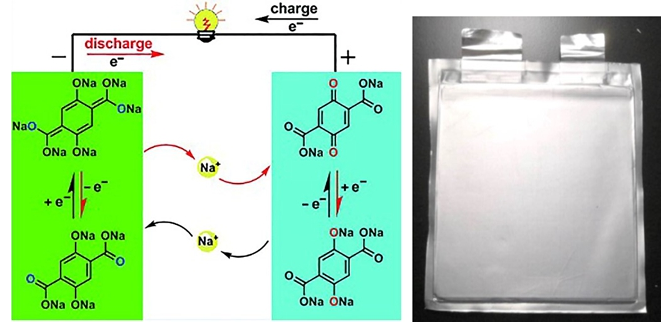Research of academician Jun Chen’s group received natural science 1st prize of Science Research Famous Achievement Award in Higher Institution (Science and Technology)
Concerned about safety, stability and limited resources of lithium-ion batteries (LIBs), researchers now works for eco-friendly, large-scale next-generation electrochemical energy storage (EES) technology to find alternatives, among which sodium-ion batteries (SIBs) are considered as a promising candidates. However, SIBs’ conversion is still limited owing to low energy density, poor cycling and rate performance and so on. Academician Jun Chen’s group has broken through in SIBs’ core issues including key electrode materials and reaction mechanisms, the dedication over a decade paving the way for further developments.

Energy, one vital base for human survival and social development, the cornerstone of national economy, state security and sustainable development. As society grows continuously and China has pledged to realize carbon emission peak around 2030 , carbon neutrality by 2060, it’s crucial to adjust energy structure and develop renewable energy vigorously.
In both development and utilization, electrochemical energy storage (EES) technology becomes increasingly important. We are about to usher in a technological revolution of new energy, the age of TWh. And among various EES technologies, LIBs now dominate portable device and new energy vehicle.
‘Nonetheless, abundance of Li is low, distribution uneven. Around 70% of Li resources are distributed in South America. In China, 80% of Li are imported, which arouses widespread concern about Li reserves,’ said Prof. Chen.
Sodium and lithium are in the same main group, possessing many similar physicochemical properties. Moreover, sodium resources are abundant, widely distributed and low cost. And SIBs are safer because of less deposition in negative electrode during fast charge/discharge. Some SIBs’ technologies and processes can be borrowed from LIBs’ due to their similarities. Therefore, SIBs are considered as one promising next-generation EES technology, meaningful to the large-scale EES for new energy and renewable energy.
‘However, large sodium ionic radius and complicated structural changes in Na-storage materials cause slow ion transmission and diffusion rate, insufficient active sites and utilization rate, poor stability of electrode/electrolyte surface interface, which further result in SIBs’ low energy density, poor cycling and rate performance,’ said Prof. Chen.
To solve the aforementioned problems, Prof. Chen’s team proposed the structural design principles for microscopic nanostructured electrodes, the regulation method for electrochemical reaction mechanism through voltage/electrolyte synergistic induction, and constructed a Mn-based layered oxide cathode with ultra-high specific energy, a porous micro-nano carbon coated polyanionic cathode with ultra-fast sodium ion transport capacity, a high-capacity anode by metal chalcogenides, an in-situ presodiated hard carbon anode with fast and reversible sodium deintercalation, and developed a new symmetric organic SIB based on inorganic-organic hybrid sodium salt. These innovations provide essential theoretical foundation and experimental support for the development of high-performance SIBs.
Recently, Ministry of Education announced the complete award list for Science Research Famous Achievement Award in Higher Institution (Science and Technology). Project “Key Electrode Materials and Mechanism of SIBs” lead by Prof. Jun Chen was honored the first prize.
While elaborating basic study, Prof. Chen’s team promotes scientific research into application, several achievements having obtained Chinese invention patents authorizations. The team carries out industry-university-research cooperation with well-known battery companies like Leoch Battery (Anhui), Jiayuan Technology (Guangdong), Sunwoda (Shenzhen), Ejeve (Tianjin), co-building national enterprise technology centers. Nankai University & Cangzhou Bohai New Area green chemical institute is also established in cooperation with municipal government of Cangzhou, where some key SIB electrode materials are under pilot tests and practical conversion.
College is the junction of science, technology, talents and innovation. For years Prof. Chen’s group combine education and scientific research, attentively training talents. He lectured on “Chemistry and Energy”(excellent video course, Minister of Education) as well as core courses such as “General Chemistry”, ”Energy Chemistry”, “Introduction to New Energy Science and Engineering”; edited and republished a series of relevant textbooks; presided over the first batch of new engineering research and practice projects of MOE New Energy Science and Engineering Specialty Construction and Exploration, which has passed the final acceptance and is continuing to expand and deepen. A number of innovative talents in the field of electrochemical energy storage have been cultivated and become the mainstay each. In the past 5 years, a total of 38 postdoctoral and graduate doctoral and master students have been trained.

